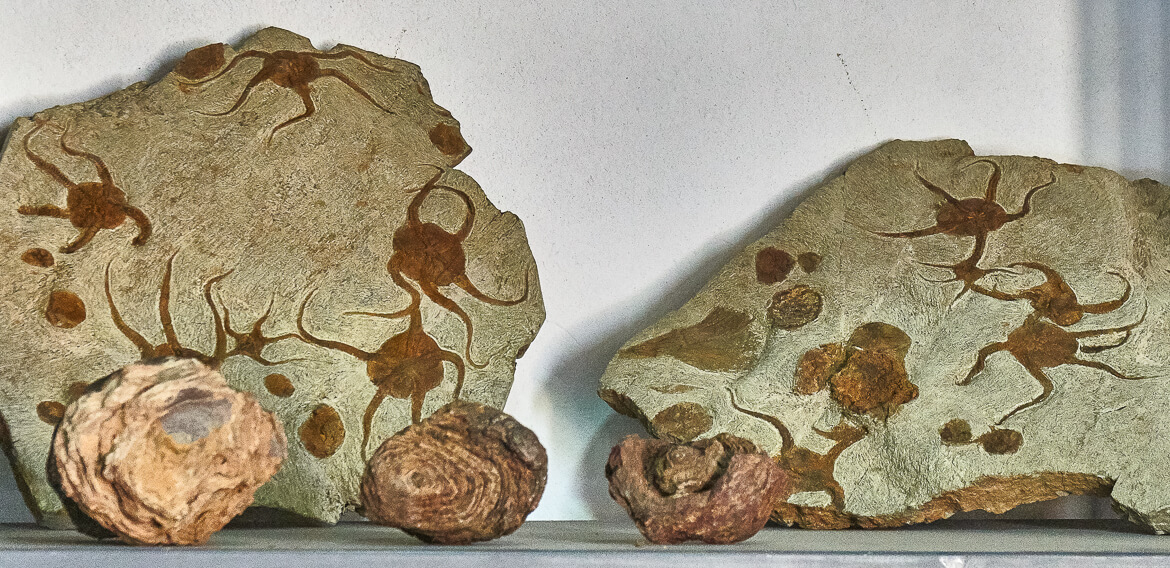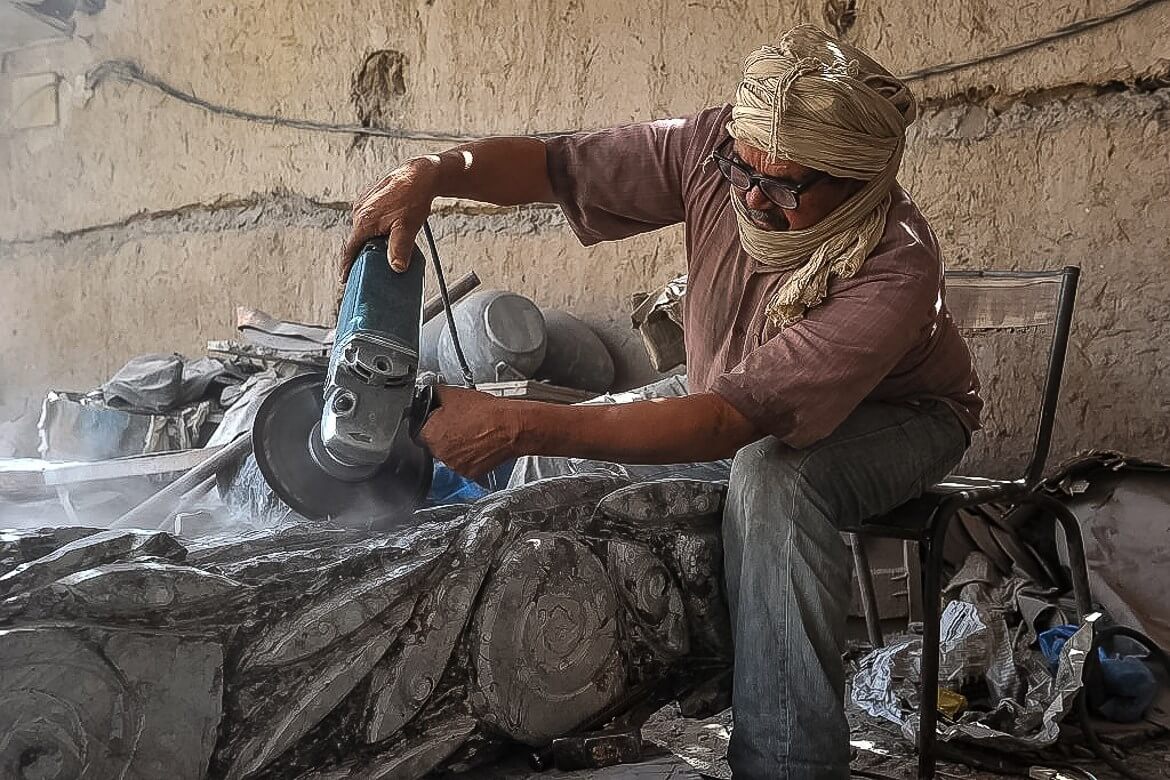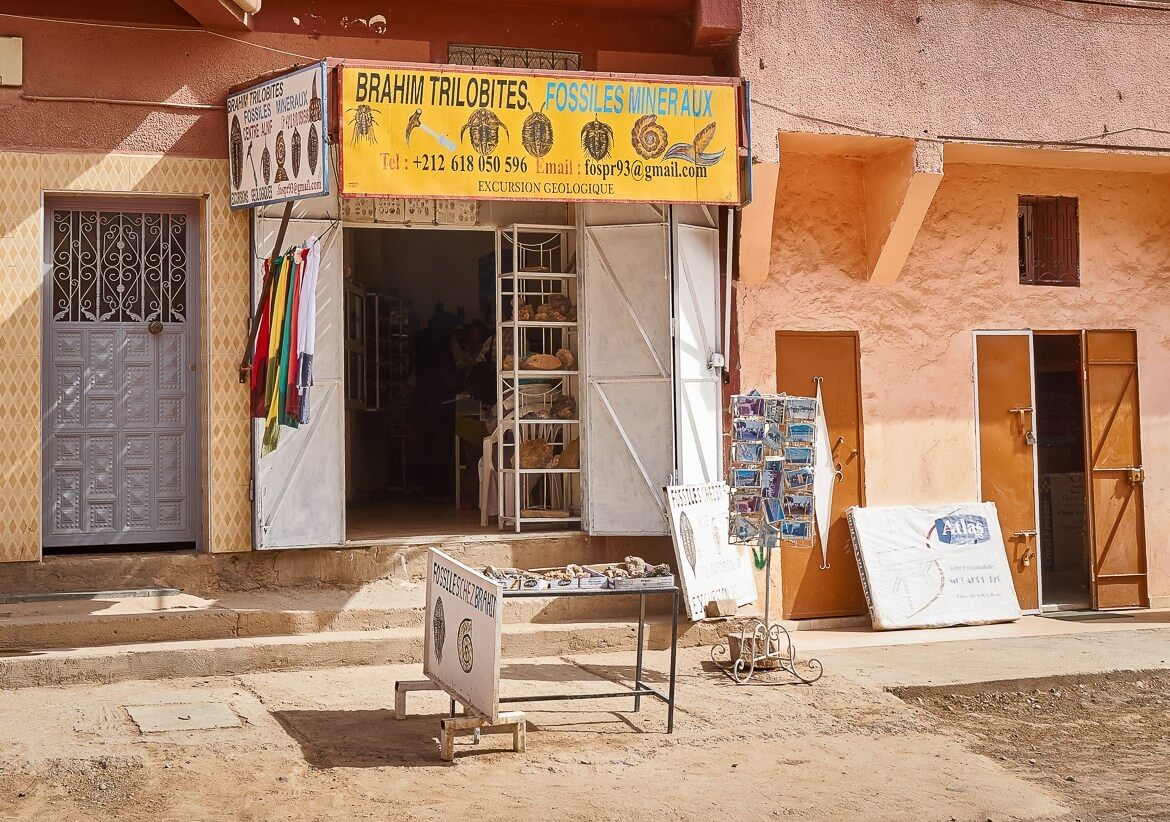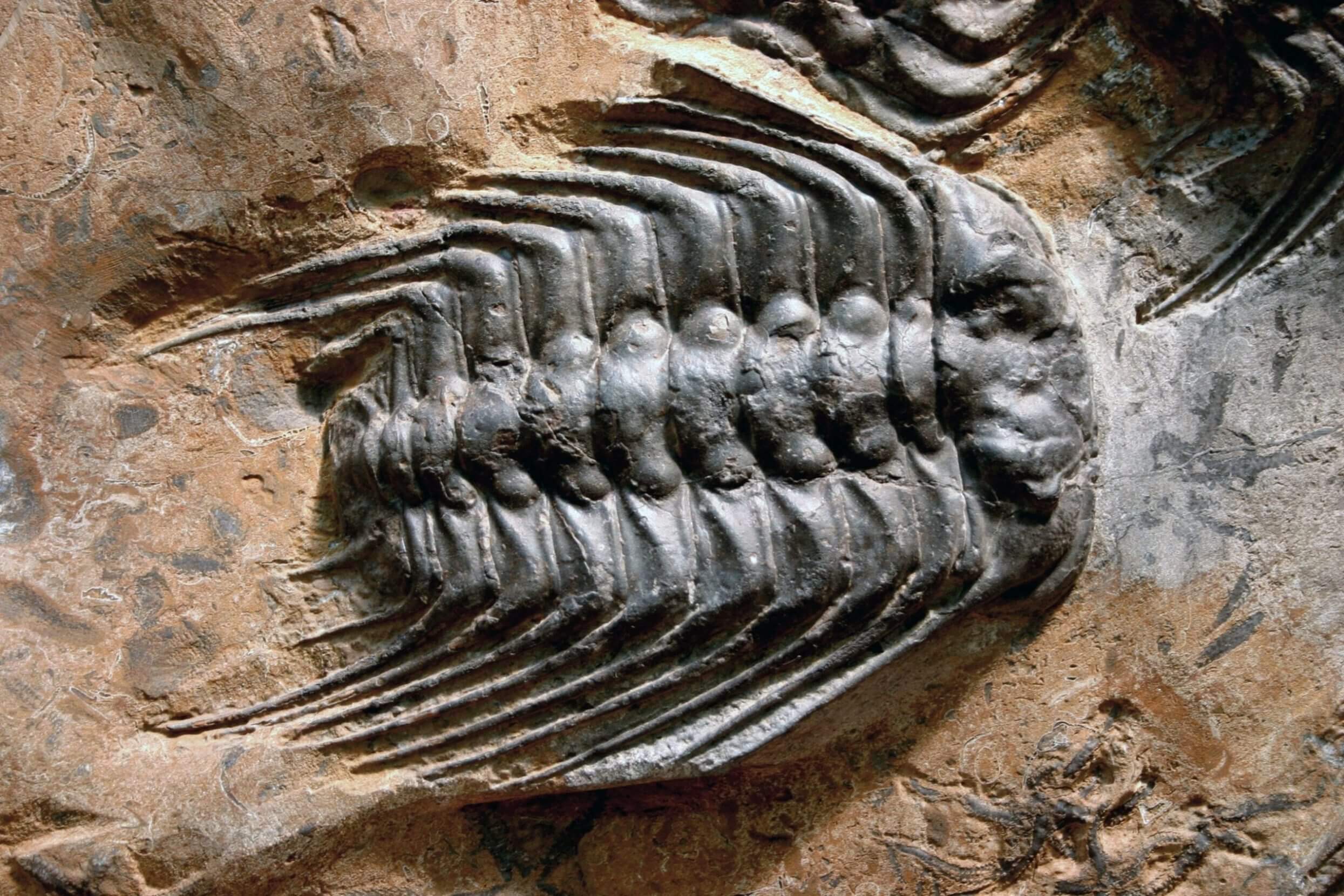Support Hidden Compass
We stand for journalism, science, history, and hope. Make a contribution to Hidden Compass and stand with us.
In the Moroccan town of Erfoud, men polish massive chunks of ancient, fossil-filled limestone into tabletops, sinks, and art pieces with surfaces that shine like windows into their Palaeozoic past. Long-dead sea life lines shop shelves, where I run my fingers over a baffling array of ancient marvels and wonder if my touch could damage these beautiful specimens. When the shop owner walks over, he answers before I can even ask the question.
It is all for sale, he says.

These fossilized starfish for sale are records of Eastern Morocco’s ancient seas. PHOTO: GRAEME CHURCHARD.
Ali steered his SUV through rocky red plateaus, squinting through sun at the shadow-draped landscape that formed a gateway to the Moroccan desert.
Ali was a young family man with a good-natured grin who grew up in this part of eastern Morocco, somewhere near the windswept expanse of sand that lined the Algerian border. It was there that he, along with his father and brother, had once earned livelihoods digging fossils from the hard ground using shovels, mattocks, axes, and wheelbarrows.
But Ali’s family doesn’t do that anymore, hasn’t for years. He said they dug until the fossils ran out.

A sculptor cuts into a piece of rock filled with fossils in Erfoud, Morocco. In the middle of a sprawling palm grove in the remote eastern desert, these once abundant treasures have all but vanished. PHOTO: STR/AFP/GETTY IMAGES.
~~
Morocco’s fossil history began long before Ali picked up a shovel. During the Palaeozoic era (between 540 and 250 million years ago) Drâa-Tafilalet (the region I saw with Ali) was covered by a warm, shallow sea. Schools of orthoceras — squid-like creatures with pointed shells — traversed its waters. Bug-like trilobites swam or scuttled below them, and spiral-shelled ammonites floated here and there. Many of these creatures died and were preserved in the limey sea floor, their hard shells remaining long after softer organisms rotted away. Their relics became encased in stone — petrified ghosts of forgotten waters.
In the 1980s, Morocco’s fossil business rapidly expanded as the country worked to modernize its economy, of which tourism became an increasingly vital part. Ali’s father saw an opportunity and eventually his two sons joined him.
“The work was like fighting with life,” Ali said, explaining how some fossils could take more than two weeks to extract from the mountains, a frustrating task beneath a scorching sun.
At the time, it was seen as a new and modern career that Ali estimated drew 1,300 local families to pry prehistoric treasures from the earth. On a good day, he’d find a trilobite, which was considered to be the most special kind of fossil — and the most valuable. And a good day could be the difference between getting $350 instead of $7 when he sold his finds to a local fossil shop.
Many of these creatures died and were preserved in the limey sea floor, their hard shells remaining long after softer organisms rotted away. Their remains became encased in stone — petrified ghosts of forgotten waters.
But 20 years after Ali’s family began digging, the fossils at the surface where they once searched were gone. To continue to dig would require high-powered machinery, which Ali’s family couldn’t afford. Others carried on the work in different areas, or wrangled the money for digging machines, but for Ali’s family, the fossilized ocean of their livelihood had dried up.
~~
In 2019, nearly 40 years after Ali’s family started their business, more than 50,000 Moroccans still earn a living in the fossil trade, according to the Geological Society of London. They work as hunters using high-powered machines and manual digging tools, as merchants and artisans, and in any other way that they can to profit from the artifacts in the land. Technology and devices have allowed fossil hunters to dig into the desert surrounding the oasis city of Erfoud. Where petrified sea creatures cluster, shops to buy them are a dirham a dozen.

The land of Morocco’s Drâa-Tafilalet region was once abundant with fossils, but after years of industry, they are instead found on shop shelves as souvenirs. Once sold, fossils are impossible to track. PHOTO: GRAEME CHURCHARD.
It’s impossible to track these fossils, because just about anyone can pick them up in a store. Paleontologists like Nizar Ibrahim comb the Sahara for dinosaur bones, but Ibrahim’s world-renowned discovery of a partial Spinosaurus skeleton was made possible by an Erfoud fossil hunter who sold him a box of Spinosaurus bones. You can find Moroccan fossils in natural history museums like the Smithsonian, or in London, but I also spotted a far less dignified display in Ouarzazate, where my hotel room’s bathroom counter was studded with a school of cone-shaped orthoceras.
Online, fossils can be purchased from anywhere in the world. In 2019, the Moroccan-found skeleton of an extinct marine lizard known as the Mosasaur Halisaurus Arambourgi could be purchased on eBay for $50,000, while a rock stacked with Dikelocephalina trilobites was going for $29,999. Small ammonite or orthoceras can be ordered online for a few bucks. It’s hard to know if these are authentic, but they’re certainly out there and available for the right price — a price that’s often exponentially higher than what Ali used to earn.
Watching Ali drive silently through the desert, I wondered if he was troubled by how these finite records of ancient life were being pried from the earth, recreated into furniture and decorations, and finding new homes across the globe. The commercial paleontology that’s practiced so readily in Morocco — providing jobs and uncovering remnants of human history and dinosaur bones — is controversial. While some private fossil collections do end up in museums, some scientists and historians fear that privately-sold fossils could be lost to science forever, erasing an important part of Morocco’s natural history.
~~
The fear of lost fossils nags at dinosaur expert Don Lessem, who has authored an impressive number of books on prehistoric creatures, acted as an advisor for the film Jurassic Park, and cast realistic dinosaur recreations for traveling museum exhibits.
“Selling fossils is bad for science. Period,” Lessem said.
Where petrified sea creatures cluster, shops to buy them are a dirham a dozen.
According to Lessem, “When fossils are sold, their monetary value puts them out of reach for scientists and museums.” This means scientists may never have the opportunity to draw new information from the finds, and the public may never have a chance to view important pieces of history.
But Lessem added that the situation is far from simple. He said he sees the fossil trade as an “inescapable evil,” and believes that commercial paleontology should be regulated to preserve scientifically important finds rather than outlawed entirely. However, while he said that some fossils, like Ibrahim’s Spinosaurus, are rare and must be properly cared for, he added that not all fossils merit the same kind of protection.
“The 300-million-year-old sea creatures found in the Atlas Mountains of Morocco are incredibly common,” he said. “And so of no special value to science.”
Lessem has put his money where his mouth is: His living room table, purchased at the annual Gem and Mineral Show in Tucson, Arizona, is made from a slab of Moroccan stone swimming with ammonites and orthoceras.
Of course, even the most plentiful fossils are a finite resource that can eventually deplete.
~~

Trilobites like this one could be transformed into countertops or coffee tables, and experts question if Morocco’s lucrative fossil trade is erasing parts of history. PHOTO: KEVIN WALSH.
In the car with Ali, I thought about all of the fossils that he dug up — the trilobites bristling with segmented legs, the ammonites curled into pleasant, ridged spirals — and wondered where in the world they ended up. Did they become a bathroom counter in a hotel like the one that I saw? Were they buried in the home of a wealthy collector, or perhaps displayed behind glass in a museum? Or maybe they were on the shelf in a child’s bedroom, collecting dust beside other souvenirs and knick-knacks. Wherever their final home, those fossils were no longer part of the rust-colored Moroccan landscape that Ali drove me through.
As we traveled along, I noticed that, just over a nearby ridge, there were men hunting for buried treasure. Perhaps they would find the petrified shells and bone they sought. Or perhaps those ancient remains had already been taken — ripped out from under our feet.
Kori Perten
Kori Perten is a writer and editor based in the Boston area—when she’s not traveling the globe, that is.
Never miss a story
Subscribe for new issue alerts.
By submitting this form, you consent to receive updates from Hidden Compass regarding new issues and other ongoing promotions such as workshop opportunities. Please refer to our Privacy Policy for more information.



